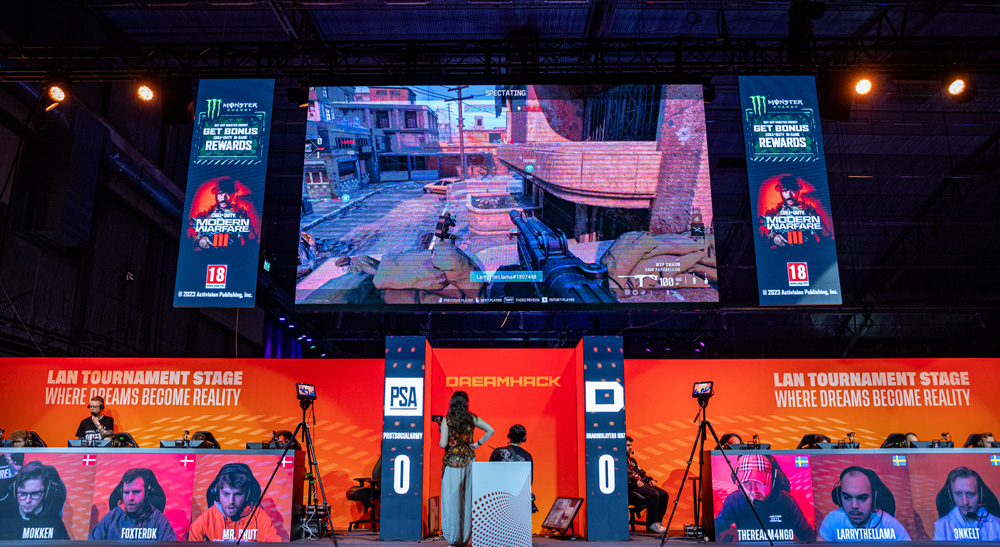Fremont, CA, USA – Monday, January 29, 2024 – With 45,000 attendees and a record breaking 17,000 people on a single day, DreamHack Winter 2023 was a melting pot of esports activities. It wasn’t just a gaming festival; it was an immersive experience bringing together the world’s best esports athletes, over 200 content creators and numerous expo partners. The festival showcased a diverse range of competitions, including ESL Challenger, FIBA, R1, Formula 1 and Brawl Stars, each adding a unique flavor to the esports extravaganza.
The ESL Challenger stage at DreamHack offers aspiring teams a platform to showcase their skills. Integrating ESL Challenger into DreamHack gives attendees a glimpse into the competitive heart of esports. “Challenger is a chance for aspiring teams to prove themselves as world class athletes and qualify for the sport’s largest stages,” explains Martin Bergström, ESL FACEIT Group’s (EFG) head of broadcast technology for Sweden.
SRT for Remote Production
Employing just two engineers and three camera operators onsite, the tournament’s remote production setup exemplifies efficiency. “Our goal was to achieve a lean operation on the ground that would reduce shipping costs, setup time and onsite presence,” he reveals. “With that in mind, we developed an approach using the SRT protocol to transport signals back to our studio in Stockholm, where we could deliver all facets of the live production.”
Bergström adds, “The paramount challenge we faced was managing the latency of feeds, with our production team at the venue monitoring those feeds to ensure optimal transmission of video and audio. The tournament’s proximity to our studios, alongside the decision to use SRT, also helped with signal latency.”
With several years of experience in remote productions, EFG expertise in setup is well established. “We proactively mitigate potential issues by continuously evolving and refining our approach, which includes comprehensive pre testing in collaboration with our global broadcast team.”

The Backbone of Esports Production
Blackmagic Design’s role in DreamHack’s production is pivotal. From signal ingestion to switching, playout and camera operations, including the URSA Broadcast G2 camera, Blackmagic technologies were integral at every production stage.
“We use Blackmagic Design products heavily throughout our workflows, from the hundreds of converters for SDI, fiber and audio, to multiple ATEM Constellation 8K live production switchers to the largest Universal Videohub 288 router, which is populated to the max with video signals,” says Bergström.
EFG required a studio space versatile enough to accommodate both small scale and large scale productions, according to Bergström. “The design focused on enabling multiple production rooms to operate in unison with minimal setup effort. Flexibility and reliability were crucial in creating a space capable of handling complex productions such as DreamHack while transitioning back to smaller scale projects within days.”
A fundamental aspect of the Stockholm studio’s design is its unparalleled flexibility, allowing seamless integration between production rooms and studio spaces.
“The studio is interconnected with fiber connections, centralized through the server room. This setup houses most of our core broadcast equipment, enabling us to rapidly scale up or modify our production capabilities as needed. This versatility has proven invaluable on numerous occasions. This arrangement also provides a fail safe, as equipment can readily serve as backups in case of malfunctions.”

Streaming and Broadcast
The ESL Challenger competition and other DreamHack content are primarily streamed on Twitch, alongside broadcasts by external media rights partners. This widespread coverage ensures that esports fans across the globe can partake in the excitement of DreamHack, no matter where they are.
Automation, powered by Bitfocus Companion, played a crucial role in the event’s production. With multiple graphic layers and program outputs, automation ensures that every aspect of the ATEM switchers is perfectly orchestrated, enhancing production quality while streamlining operation.
“We are continually updating our studio with the latest technologies to create an exceptionally versatile environment for the future of esports and video production,” says Bergström. “Looking ahead, our focus is on significantly enhancing our network infrastructure. This move is geared toward facilitating more IP based video production, enabling the low latency sharing of video and audio signals between two locations.”
“Blackmagic stands out as a pivotal technology provider in the industry, enabling high quality production at a reasonable cost. It remains a prominent and recognized name in the esports market,” he concludes.

About Blackmagic Design
Blackmagic Design creates the world’s highest quality video editing products, digital film cameras, color correctors, video converters, video monitoring, routers, live production switchers, disk recorders, waveform monitors and real time film scanners for the feature film, post production and television broadcast industries. Blackmagic Design’s DeckLink capture cards launched a revolution in quality and affordability in post production, while the company’s Emmy™ award winning DaVinci color correction products have dominated the television and film industry since 1984. Blackmagic Design continues ground breaking innovations including 6G-SDI and 12G-SDI products and stereoscopic 3D and Ultra HD workflows. Founded by world leading post production editors and engineers, Blackmagic Design has offices in the USA, UK, Japan, Singapore and Australia. For more information, please go to www.blackmagicdesign.com.

